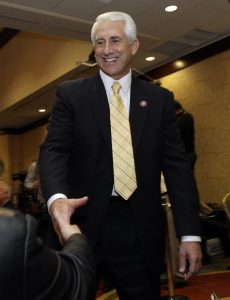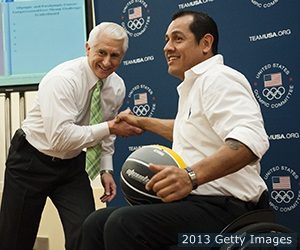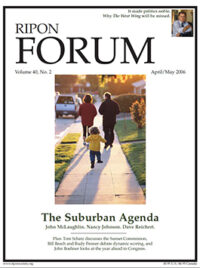
Dave Reichert represents Washington’s 8th Congressional District in the U.S. House of Representatives. Elected in 2004, he first came to national prominence as the detective who led the effort to capture the Green River serial killer. He serves on three committees in Congress, and is Chairman of the Homeland Security Subcommittee on Emergency Preparedness, Science and Technology. He is also a member of the Suburban Caucus. The Congressman discusses his role in the Caucus below.
∗∗∗∗∗∗∗∗∗∗∗∗∗∗∗∗∗∗∗∗∗∗∗∗
RF: There’s been a lot of discussion so far this year about developing a Suburban Agenda that would be geared toward helping families in their everyday lives. You are part of a core group in the House of Representatives working on a plan to do just that. Could you tell us about this effort?
REICHERT: Up until very recently, we viewed our nation as one third rural, one third urban and one third suburban. That’s just not accurate anymore. America is overwhelmingly suburban, with less than 20 percent of constituents coming from rural areas or big cities. Over half of all voters live in suburbs or small cities. Additionally, these voters tend to be the “swing” voters we always hear about. If you look at the swing districts in Congress, almost all of them are suburban districts. But our political agenda in Congress has thus far failed to recognize and specifically target this.
If you look at the swing districts in Congress, almost all of them are suburban districts. But our political agenda in Congress has thus far failed to recognize and specifically target this.
So Congressman Mark Kirk of Illinois went to about 20 suburban areas and asked the families who live there what was important to them, what concerns were on their minds. They told him the country is on the “wrong track.” Repeatedly, he heard about concerns with health care, crime, education, taxes and the environment. Every single one of those concerns is one I hear over and over again in my own district in Washington State.
The members of the Suburban Caucus have made a top five list of priorities for the Suburban Agenda, which came out of those discussions with suburbanites: keeping pedophiles from becoming teachers; making health insurance fully portable; long term saving for children; more cleanup and less court for the superfund environment program; and expanding federal backup to fight international drug gangs. This last priority is where my own background and expertise comes in, but these ideas together form the backbone of the Suburban Agenda.
RF: What is your role and what issues are you personally looking at?
REICHERT: I was tapped by Mark Kirk chiefly for my experience fighting drugs and the spread of gangs from urban communities into the nearby suburban areas. Gangs backed by international drug cartels are moving beyond cities into suburban schools, threatening to overwhelm local police departments. As Sheriffof King County, which is the 12th largest county in the nation and includes Seattle and the surrounding suburbs, I wrestled with the spread of gangs and drugs from Seattle to outlying areas. With over 500,000 registered members in the U.S., drug gangs in America would be the fifth largest army in the world. I took the lead as Sheriff of King County to expand the federal prosecution of gang members, emphasizing the importance of prosecuting gangs who have a presence in schools and that seek to recruit new members there.
The increased mobility of our population requires that we take necessary steps to ensure that those we entrust with the care and education of our children are worthy of that responsibility.
The increased presence of meth labs and all of the problems that go along with that are something I’m particularly experienced with. The West coast has been dealing with a severe meth problem since the early 1990s, and has actually fought through the worst of it due to Washington State’s very progressive, aggressive approach to fighting the movement of meth into our communities. I’d like to say I played more than a passing role in that fight. I hope that our experience in Washington State will help other communities in the Midwest and East.
I believe my role as a vocal opponent of domestic violence could also have a place as we determine what this group’s priorities will be.
RF: Some people might scoff and say this is just another attempt by Washington to put a slogan on an issue and impose a “one-size-fits-all” solution on people’s problems. What makes this effort different?
REICHERT: The relatively recent development of suburban neighborhoods as important political areas produced a new reality, which has not been given the same study or consideration that rural or urban areas have. It’s only a natural progression to move our focus as the population migrates as it has from rural to urban to suburban.
RF: On a similar note, some people might say that some of the issues being talked about as part of the Suburban Agenda – teacher checks and mandatory Internet filters are two examples — are issues better addressed and handled by the states. Why do you believe there is a role for Washington in these areas as well?
REICHERT: The Internet isn’t just an intrastate capability—it crosses state lines. It crosses national boundaries and is an international issue. Teachers also can move as they please, changing state residency when they wish. Information may not be easily or readily available from state to state. The increased mobility of our population requires that we take necessary steps to ensure that those we entrust with the care and education of our children are worthy of that responsibility.
RF: What about costs? The federal government is running a deficit as it is. Can we afford to be undertaking something as ambitious the Suburban Agenda?
REICHERT: There is no dollar figure attached to the Suburban Agenda. It is more accurately described as providing a focus for suburban priorities which can be included in current bills. We’re already doing that with things like permanent tax cuts, small business incentives and programs to reduce drug and gang activity. A very recent example was the inclusion of teacher background checks in the Children’s Safety and Violent Crime Reduction Act, which the House voted on recently.
RF: Your background as a Sheriff makes you ideally suited to tackle these issues head-on. How much does your experience in local law enforcement shape your efforts on the issues you are working on today?

REICHERT: My experience as a cop has a substantial influence on the issues I’m working on. Peter King, Chairman of the House Homeland Security Committee, tapped me last year after Hurricane Katrina to be Chairman of the Subcommittee on Emergency Preparedness, Science and Technology. He did so despite my relative inexperience in the House — I am only the sixth freshman in the history of Congress to chair a subcommittee — because he understood the value of my law enforcement experience. That experience is the reason Mark Kirk tapped me for the Suburban Agenda as well. I’m also Vice-Chairman of the Coast Guard and Maritime Transportation Subcommittee of the House Committee on Transportation and Infrastructure because of my experience working with the Coast Guard and protecting ports in Washington State.
Beyond that, my experience as a cop shapes my Subcommittee’s agenda too. We’ve dedicated ourselves this year to solving the problems our first responders face with operability and interoperability as they attempt to communicate during a disaster. Operability is the ability of communication devices to function when their users require them to and interoperability is the ability for the varied types of communication devices used by all emergency response personnel and various other officials in the event of a disaster to work together, ensuring information is shared in a timely, efficient and effective manner. I know from firsthand experience what it’s like to call for back-up and not be able to reach your colleagues.
My experience as Sheriff also taught me the importance of collecting useful, timely intelligence. As a Congressman, I’m doing everything I can to make sure our intelligence community has information gathering capabilities that ensure they have access to the best, most accurate information available.
RF: Finally, this is very much a vision-based plan, where you have a number of different issues held together by one overarching theme. What one message would like people to come away with as they become more familiar with the effort and some of the goals you and your colleagues are trying to achieve?
REICHERT: Suburban issues are different from rural and urban issues. Our suburban priorities are transportation — suburban dwellers often commute to and from their jobs, making their roadways of utmost importance — the migration of gangs into suburban areas, and the increasing prevalence of drug use by suburban students. We are listening to our constituents in suburban areas and the Suburban Agenda is the response to what we’re hearing. Suburban constituents’ concerns are unique and they require a focused, coordinated approach, which the members involved in this effort are dedicated to providing.




